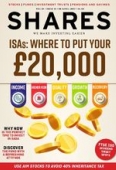Archived article
Please note that tax, investment, pension and ISA rules can change and the information and any views contained in this article may now be inaccurate.
The hazards of client concentration

The devastating slide in Imagination Technologies (IMG) shares on 3 April after being ditched by its largest customer Apple is just the latest and most high profile in a string of setbacks for firms with heavily-concentrated client bases.
Shares in the microchip designer fell by more than 60%, with more than £500m wiped off its market value, as Apple said it would stop using the group’s graphics intellectual property (IP) within the next 18 months to two years.
Big chunk of revenue
According to one forecast before the news, Apple was expected to be worth £65m of Imagination’s £140.3m revenue for the year to 30 April 2017.
The share price collapse was compounded by the market also effectively removing a takeover premium previously applied to the stock. Investors had long expected Apple to make a bid for Imagination.
The companies clearly won’t be getting hitched now that Apple has decided to develop its own graphics solution internally.
Imagination is crying foul over potential patent infringements but given the relative size and balance sheets of the two firms any battle on the issue looks a mismatch.
Who else is in the same boat?
In October 2016 electronics and high performance materials firm Laird (LRD) also saw a bite taken out of its share price thanks to its reliance on Apple.
Around 20% of its business came from providing radio frequency shielding for iPhones. Softer handset sales were a big factor behind Laird’s significant profit warning.
In February 2017, a little over six months after joining AIM, Rugby-based Autins (AUTG:AIM) shocked the market with its own profit warning linked to a single customer.
Autins supplies specialist compound materials designed to cut noise nuisance and reduce wasted heat, largely used in the automotive industry.
Jaguar Rover is thought to account for half of Autins’ annual revenue. And it was reportedly a contract with Jaguar Rover, where the terms of a supply deal saw volumes cut and the timing of deliveries altered, which blew an estimated 15% hole in Autins’ forecast revenue for the year to 30 September 2017.
Playing with a weak hand
This illuminates the other key issue with being reliant on just one or a handful of major customers, namely you are left in a very weak negotiating position.
In early 2017 food producer Premier Foods (PFD), which in its previous financial year derived 80% of its revenue from four UK supermarket chains, cut its full year profit guidance by 10%. The company said it was taking longer than expected to agree supply deals with food retailers.
The maker of Mr Kipling cakes and Bisto gravy has been trying to pass on higher input costs resulting from the devaluation of sterling.
Given Tesco (TSCO), in particular, was widely perceived as having won a battle over pricing with a much more heavyweight opponent in the form of consumer goods giant Unilever (ULVR), it is hard to fancy Premier’s chances.
And with the shares currently trading at 44.9p, it’s little wonder management are continuing to take heat from activist shareholder Paulson & Co over rejecting a 65p per share offer from US rival McCormick in April 2016.
In the firing line?
We note that cash-generative defence outfit Cohort (CHRT) derived more than 60% of its revenue from the UK Ministry of Defence (MoD) in its financial year to April 2016.
The acquisitive firm has been on a growth tear and shareholders have been rewarded with a four-and-half-fold increase in its share price in the last five years to the current 434.5p.
Investors should be aware of a risk to earnings from having so much business with one party, particularly given recent reports of a £1bn shortfall in the MoD’s budget.
Another stock deriving a decent portion of earnings from one customer is online payment processing firm Paysafe (PAYS).
It generates 20% of revenue from a single merchant in Asia. Admittedly the percentage of group earnings from this undisclosed party has been slowly decreasing over the years.
Important information:
These articles are provided by Shares magazine which is published by AJ Bell Media, a part of AJ Bell. Shares is not written by AJ Bell.
Shares is provided for your general information and use and is not a personal recommendation to invest. It is not intended to be relied upon by you in making or not making any investment decisions. The investments referred to in these articles will not be suitable for all investors. If in doubt please seek appropriate independent financial advice.
Investors acting on the information in these articles do so at their own risk and AJ Bell Media and its staff do not accept liability for losses suffered by investors as a result of their investment decisions.
Issue contents
Big News
- Special dividend on cards for Central Asia Metals?
- FTSE 100 dividend delight on overseas earnings boost
- Margin pressure hits ASOS
- Polar Capital makes a mint after Miton raid
- Brace yourself for more British takeovers
- CityFibre seeks fresh funding deal
- Sophos shines and shares at record high
- Genus gets green light to launch GSS

 magazine
magazine











